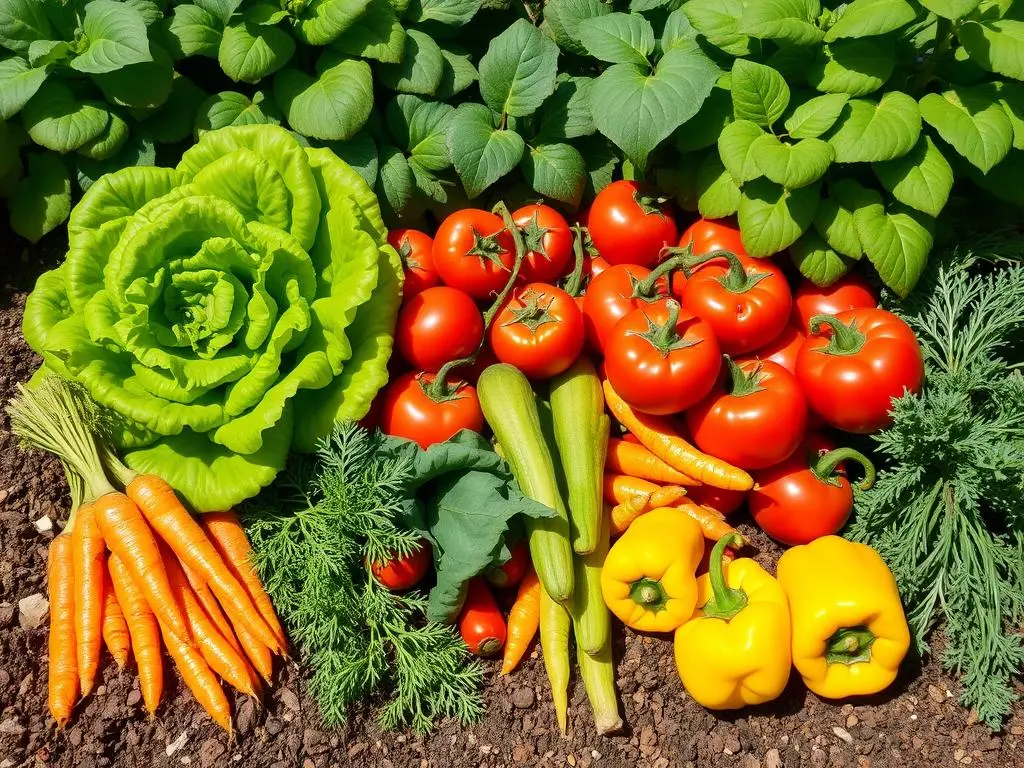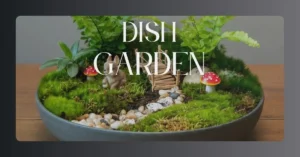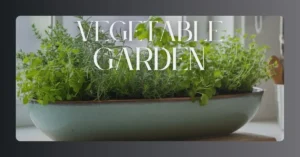Starting a garden is a rewarding journey. It’s filled with the joy of growing your own plants and enjoying fresh produce. But, where do beginners start? What are the key tips and tricks for growing a thriving garden?
In this guide, we’ll share the basic gardening tips and techniques for beginners. We’ll cover everything from choosing the right tools to understanding plant care. You’ll get the knowledge and confidence to start your gardening journey today.
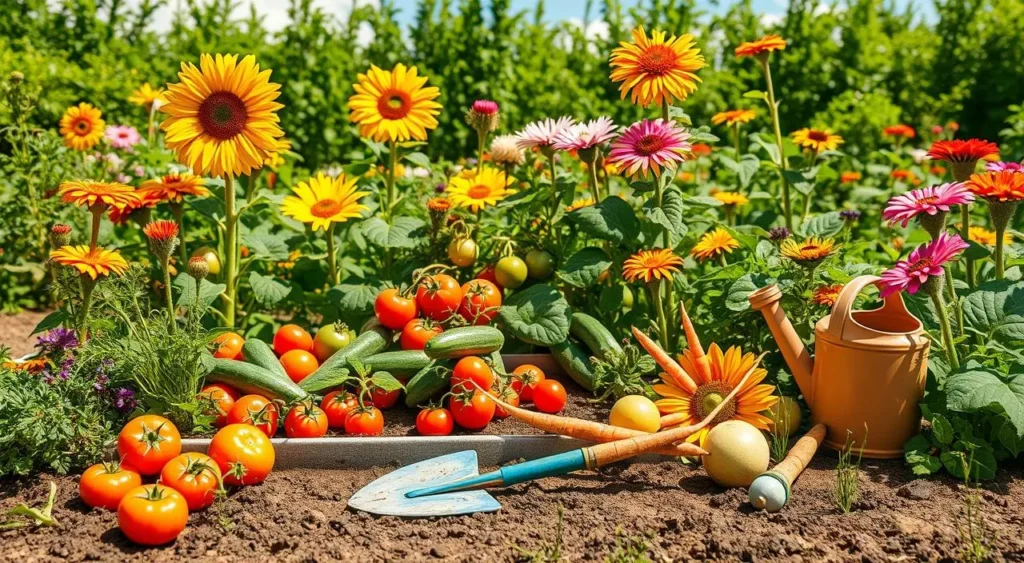
Key Takeaways
- Discover the must-have gardening tools and equipment for beginners
- Learn how to choose the ideal location and soil for your garden
- Understand the importance of plant hardiness zones and planting schedules
- Explore water management and basic plant care techniques
- Identify common mistakes to avoid in your first garden
Understanding Basic Gardening Tools and Equipment
Starting your gardening journey? It’s key to have the right tools and equipment. From basic hand tools to the right soil and containers, we’ll cover the essentials for new gardeners.
Must-Have Hand Tools for New Gardeners
- Trowel – A versatile tool for digging, planting, and transplanting seedlings.
- Pruning Shears – Indispensable for trimming and shaping plants.
- Garden Fork – Helpful for aerating soil and preparing planting beds.
- Hand Cultivator – Ideal for loosening soil and removing weeds.
- Garden Gloves – Protect your hands from thorns, dirt, and other hazards.
Choosing the Right Soil and Containers
The quality of your soil and containers is crucial for plant health. Look for well-draining, nutrient-rich potting mixes or compost. Consider the size of your plants, drainage, and the material’s durability when choosing containers.
Essential Safety Equipment
Gardening can be physically demanding and expose you to the elements. So, safety is key. Invest in a wide-brimmed hat, sunscreen, and knee pads to protect yourself from the sun and reduce body strain.
With the right tools, soil, and safety gear, you’re set for a thriving garden. These gardening tips and gardening starter tips are just the start of your tips on gardening.
Selecting the Perfect Location for Your Garden
Starting a garden is exciting and rewarding. But, the key to a great garden is choosing the right spot. We need to think about many things to make sure our plants grow well. Here are some tips for picking the best place for your garden.
Sunlight Exposure
Sunlight is very important for plants. Most need at least 6 hours of direct sun a day. Look around your property for sunny spots. Stay away from places that are too shady or get too much sun in the afternoon.
Soil Quality
Soil quality is also key. Test your soil to see its pH level, nutrient content, and type. You want soil that drains well and is full of nutrients. If your soil isn’t good, add compost or other organic matter to make it better.
Water Accessibility
Another Gardening Tips having easy access to water is important for your garden. Pick a spot close to a hose, spigot, or irrigation system. Also, think about the terrain. Areas with good drainage and no standing water are best for gardens.
Wind Protection
Strong winds can harm your garden. They can damage plants and stop them from growing. Gardening Tips for beginners is try to find a spot that is protected from the wind. This could be near buildings, fences, or with windbreaks like shrubs or trees.
By considering these factors, you can find the perfect spot for your garden. The right location is crucial for your plants’ health and beauty.
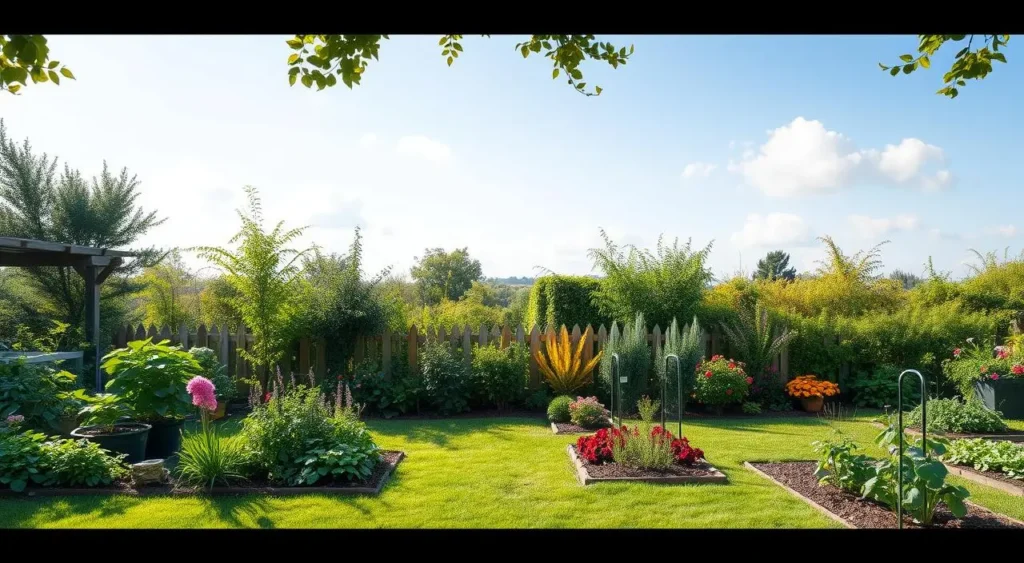
| Sunlight Exposure | Soil Quality | Water Accessibility | Wind Protection |
|---|---|---|---|
| 6+ hours of direct sunlight per day | Well-drained, nutrient-rich soil | Easy access to a reliable water source | Sheltered from prevailing winds |
“The right garden location is the foundation for a thriving and bountiful harvest.”
Gardening Tips for Beginners: Your Step-by-Step Guide
Starting your gardening journey can be thrilling and a bit daunting, especially if you’re new. But don’t worry! We’ve put together a detailed guide to help you become a pro in gardening.
Understanding Plant Hardiness Zones
When planning your garden, knowing your plant hardiness zone is key. This info tells you which plants will do well in your area’s climate. Furthermore, by knowing your zone, you can pick the best plants and when to plant them.
Timing Your Planting Schedule
Timing is crucial in gardening. A planting schedule based on the seasons ensures your plants get the right conditions. Keep an eye on frost dates and plan your planting to boost your garden’s success.
Basic Soil Preparation Techniques
To begin with, preparing your soil is vital for a healthy garden. Start by tilling the soil to loosen it and improve drainage. Next, add compost or aged manure to enrich it. Finally, test the soil’s pH and adjust it if needed for the best growing conditions.
To begin with, by following these gardening tips for beginners, you’ll be on your way to a vibrant, productive garden. Moreover, remember, gardening is a journey. Don’t be afraid to try new things and learn as you go. Finally, happy planting!
“The glory of gardening: hands in the dirt, head in the sun, heart with nature. To nurture a garden is to feed not just the body, but the soul.” – Alfred Austin
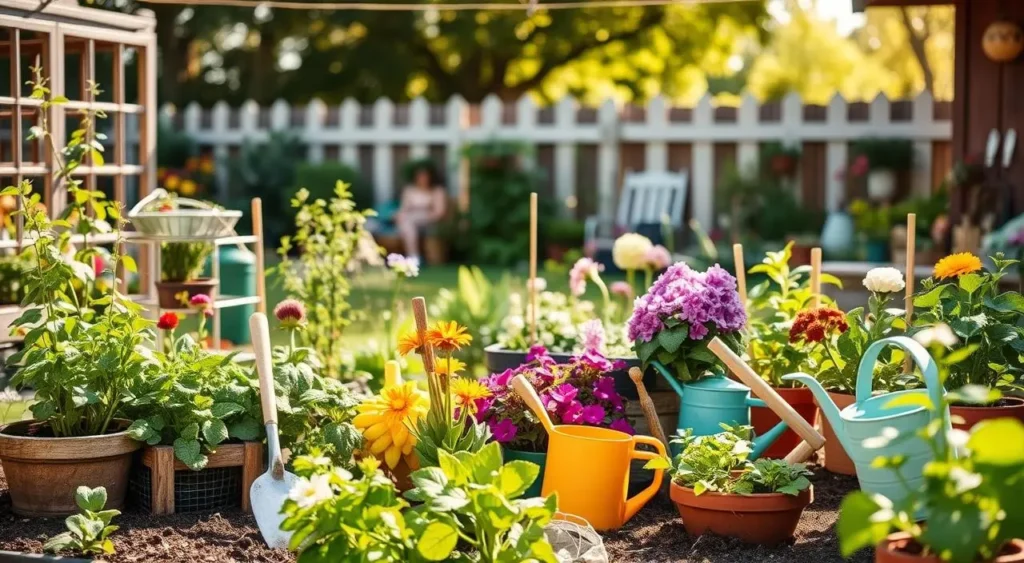
To start with, a vibrant garden scene featuring diverse beginner-friendly plants, including herbs, flowers, and vegetables, is presented. Next, you might notice the assortment of gardening tools like trowels, watering cans, and gloves that are strategically placed around the scene. Furthermore, the background should showcase a cozy backyard with sunlight filtering through trees, creating a welcoming atmosphere that inspires new gardeners to start their journey. In short, it’s the perfect setting for those ready to embark on their gardening adventure.
Water Management and Plant Care Basics
We all know that water management and basic plant care are key to a successful garden. Whether you’re new or experienced, these basics are crucial. They help create a vibrant outdoor space.
Watering Techniques: Finding the Right Balance
Watering your plants right is essential. The amount needed changes based on the plant, soil, and weather. We suggest watering deeply, about 1-2 inches a week. Adjust as needed to avoid too much or too little water.
Identifying Watering Issues
Watch for signs of watering problems. Wilting or yellow leaves mean plants need more water. Soggy soil and rotting roots mean you’re watering too much. Keep an eye on your garden and adjust your watering.
Gardening Tips for Beginners: Basic Plant Care Essentials
Watering is just part of plant care. Other important tasks include:
- Fertilization: Regular fertilization helps plants grow strong and bloom well.
- Pruning: Pruning encourages growth, removes dead leaves, and keeps plants looking good.
- Pest Management: Catching and dealing with pests early keeps your plants healthy.
Learning these basics will help you grow a beautiful garden. Remember, gardening success comes from being consistent and paying attention to details.
| Watering Frequency | Soil Moisture Monitoring | Fertilization Schedule |
|---|---|---|
| 1-2 inches per week | Check soil regularly for signs of dryness or waterlogging | Every 4-6 weeks during the growing season |
“The greatest gift of the garden is the restoration of the five senses.” – Hanna Rion
Common Mistakes to Avoid in Your First Garden
Starting a garden can be exciting, but it’s easy to make mistakes. Knowing these common errors can help us succeed. Let’s look at three mistakes to avoid in our first garden.
Plant Spacing Issues
One big mistake is not spacing plants correctly. Too close together can stunt growth and attract pests. Make sure to follow the spacing guidelines for each plant. This allows for healthy growth and air circulation.
Watering Problems
Getting the watering right is key. Too much water can drown plants, while too little can kill them. Watch how much water your plants need and adjust your watering schedule. Checking soil moisture and drainage is important to avoid these issues.
Soil Preparation Errors
Soil preparation is crucial for a good garden. Not adding the right nutrients or adjusting pH levels can harm plants. Test your soil and add organic matter like compost. This ensures your plants have the best growing conditions.
By avoiding these mistakes, we can help our first garden grow well. With careful attention, we’ll become better gardeners. Our hard work will pay off with a great harvest.
Seasonal Maintenance and Growth Monitoring
Gardening is more than just planting and watering. It’s about keeping your garden healthy all year. We’ll cover the important steps to keep your garden thriving.
Adapting Your Gardening Routine
Each season brings its own gardening tasks. In spring, we prepare the soil and care for new plants. Summer means watering, weeding, and supporting plants. Fall is for harvesting and getting ready for winter.
By changing your routine with the seasons, your plants will grow better and stronger.
Identifying and Addressing Plant Health Issues
It’s important to watch your plants for diseases, pests, or nutrient needs. This way, we can fix problems fast and keep your garden healthy. We’ll teach you how to spot diseases and use natural pest control.
Tracking Plant Progress and Adjusting Care
Watching your plants grow is rewarding. Keeping records helps us improve our gardening. This data guides us on how to water, feed, and prune for the best results.
A great garden needs consistent care. By following the seasons, watching plant health, and tracking progress, you’ll have a beautiful garden. Let’s learn how to garden through the seasons!
Conclusion
Gardening Tips for Beginners: Gardening for beginners is rewarding and enriching. You now know the basics of tools, soil, and water. This gives you a solid start for your gardening journey.
Patience, learning, and experimenting are key to a thriving garden. Whether you grow flowers, vegetables, or herbs, you’ll learn something new. Let’s enjoy gardening and watch our efforts create a beautiful oasis.
You’re ready to create a garden that nourishes your body and spirit. Let’s get planting. May your gardening adventures be filled with success and satisfaction. Happy gardening!
FAQ
What are the must-have hand tools for new gardeners?
New gardeners need a trowel, pruning shears, a garden fork, and a hand cultivator. These tools help with planting, pruning, and soil aeration. They’re key for many gardening tasks.
How do we choose the right soil and containers for our garden?
Pick soil based on the plants you want to grow. Some plants need well-draining, nutrient-rich soil. Others prefer acidic or alkaline conditions. Container size and material depend on the plants and your garden space.
What safety equipment should we use when gardening?
Wear gloves, knee pads, and sun protection like hats and sunscreen. This keeps you safe from injuries and sunburn. It also makes gardening more comfortable.
How do we determine the best location for our garden?
Consider sunlight, soil quality, water access, and wind protection. Knowing your property’s microclimate helps find the best spot for your plants.
How do we understand plant hardiness zones?
Plant hardiness zones are based on winter temperatures. Knowing your zone helps pick plants that can survive your winters.
How do we create a planting schedule based on seasonal changes?
Create a planting schedule for each season. Research the best times to plant your crops or flowers. Plan for starting seeds indoors, transplanting, and harvesting.
What basic soil preparation techniques should we use?
Start by tilling the soil to loosen it. Add compost or organic matter to improve fertility. Test the soil pH to ensure it’s right for your plants. These steps create a healthy soil environment.
How do we properly water our garden?
Water deeply and consistently, not often but shallowly. Watch for signs of too much or too little water. Adjust your watering schedule as needed.
What are some common mistakes to avoid when starting a garden?
Avoid planting too close together, watering inconsistently, and neglecting soil preparation. Proper spacing, watering, and soil quality are key to a successful garden.
How do we maintain our garden throughout the seasons?
Adapt your gardening routine to the seasons. Tasks like pruning, mulching, and frost protection are important. Regularly check for pests and diseases. This keeps your garden thriving all year.

